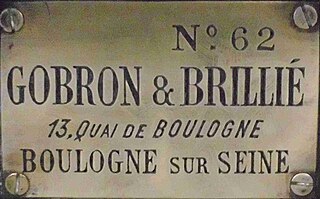
The Winton Motor Carriage Company was a pioneer United States automobile manufacturer based in Cleveland, Ohio. Winton was one of the first American companies to sell a motor car. In 1912 Winton became one of the first American manufacturers of diesel engines.

The Standard Motor Company Limited was a motor vehicle manufacturer, founded in Coventry, England, in 1903 by Reginald Walter Maudslay. For many years, it manufactured Ferguson TE20 tractors powered by its Vanguard engine. All Standard's tractor assets were sold to Massey Ferguson in 1959. Standard purchased Triumph in 1945 and in 1959 officially changed its name to Standard-Triumph International and began to put the Triumph brand name on all its products. A new subsidiary took the name The Standard Motor Company Limited and took over the manufacture of the group's products.
Armstrong Siddeley was a British engineering group that operated during the first half of the 20th century. It was formed in 1919 and is best known for the production of luxury vehicles and aircraft engines.

L'Aster, Aster, Ateliers de Construction Mecanique l'Aster, was a French manufacturer of automobiles and the leading supplier of engines to other manufacturers from the late 1890s until circa 1910/12. Although primarily known as an engine mass manufacturer the company also produced chassis for coach-works and a complete range of components.

Singer Motors Limited was a British motor vehicle manufacturing business, originally a bicycle manufacturer founded as Singer & Co by George Singer, in 1874 in Coventry, England. Singer & Co's bicycle manufacture continued. From 1901 George Singer's Singer Motor Co made cars and commercial vehicles.
The Lanchester Motor Company Limited was a car manufacturer located until early 1931 at Armourer Mills, Montgomery Street, Sparkbrook, Birmingham, and afterwards at Sandy Lane, Coventry England. The marque has been unused since the last Lanchester was produced in 1955. The Lanchester Motor Company Limited is still registered as an active company and accounts are filed each year, although as of 2014 it is marked as "non-trading".

The Knox Automobile Company was a manufacturer of automobiles in Springfield, Massachusetts, United States, between 1900 and 1914. Knox also built trucks and farm tractors until 1924. They are notable for building the very first modern fire engine in 1905.

St. Louis Motor Carriage Company was a manufacturer of automobiles at 1211–13 North Vandeventer Avenue in St. Louis, Missouri, founded by George Preston Dorris and John L. French in 1898, with French taking charge of marketing and Dorris heading engineering and production. St. Louis Motor Carriage was the first of many St. Louis automakers and produced automobiles from 1899 to 1907.

The Swift Motor Company made Swift Cars in Coventry, England from 1900 until 1931. It grew progressively from James Starley's Coventry Sewing Machine Company, via bicycle and motorised cycle manufacture. The cars ranged from a single-cylinder car in 1900 using an MMC engine, through a Swift-engined twin-cylinder 7-horsepower light car in 1904, and a 3-litre model in 1913. After the First World War a successful range was sold during the 1920s, but the Cadet of 1930 was its last vehicle as it could not compete economically with volume manufacturers such as Ford and Morris Motors.
The Calthorpe Motor Company based in Bordesley Green, Birmingham, England made a range of cars, motorcycles and bicycles from 1904 to 1932.

The Star Motor Company was a British car and commercial vehicle maker based in Wolverhampton and active from 1898 to 1932. At its peak Star was the UK's sixth largest car manufacturer and produced around 1000 cars a year.

The Matheson was a luxury American automobile manufactured from 1903 to 1912, first in Grand Rapids, Michigan, then Holyoke, Massachusetts and from 1906 in a purpose-built factory in Forty Fort, Wilkes-Barre, Pennsylvania.

Blackstone & Co. was a farm implement maker at Stamford, Lincolnshire, United Kingdom.

Fafnir was a German engine and vehicle manufacturer based in Aachen. They made a range of cars between 1908 and 1926.

Mitchell was a major brass-era automobile marque in Racine, Wisconsin, from 1903 to 1923.

Cecil Walkden Wood was a New Zealand engineer from Timaru who made New Zealand's first motorcycle in 1901 and second known indigenous motor car in 1902. He also instructed Richard Pearse on making an engine for his flying machine in 1901 and 1902.

Gobron-Brillié was an early French automobile manufactured from 1898 to 1930. The original company, Societé des Moteurs Gobron-Brillié, was founded by the French engineer, Eugène Brillié, and industrialist, Gustave Gobron, at 13, quai de Boulogne, Boulogne-sur-Seine, near Paris, in 1898.

The Clydesdale Motor Truck Company was a motor company that existed from 1917 to 1939 with headquarters in Clyde, Ohio. Initially, they made military trucks for World War I. Military contracts continued to be a large part of their business after the war, but they also sold into many other markets: general haulage, farming, and specialized vehicles such as fire trucks. They survived the Wall Street Crash of 1929 and the Great Depression, but increasingly struggling, they were wound up in 1939.
Johnson, Hurley and Martin Ltd were based at the Alpha Works in Gosford Street, Coventry, England and made engines for several car manufacturers as well as the engines for the Weaver Aircraft, which was the first monoplane to fly in England in May, 1910. They continued in various forms of engine production until c1927, with the contents of the Alpha Works being sold off by the Receiver in February 1928.



















